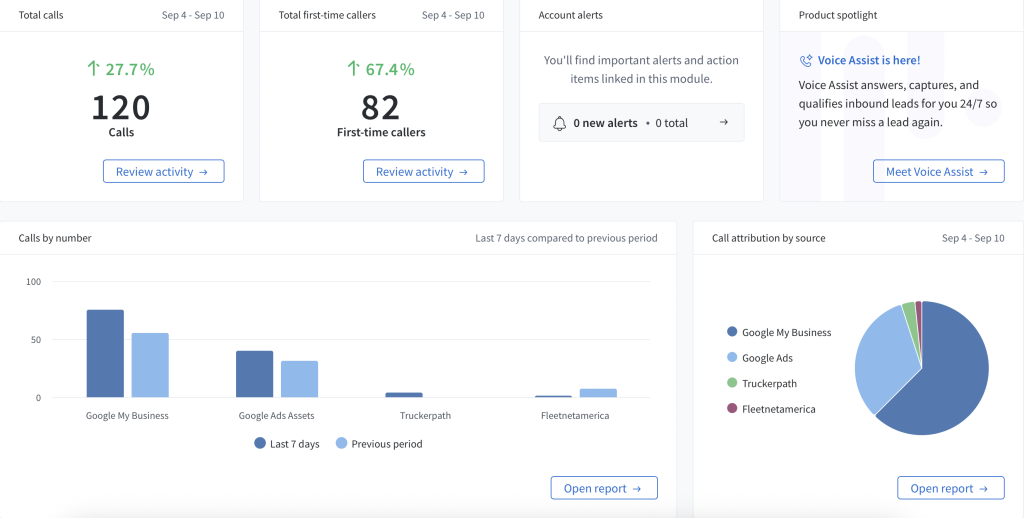Automotive Call Tracking: How It Helps Auto and Truck Repair Shops Grow
Do you know which marketing campaigns actually make your phone ring?
For most auto and truck repair shops, the phone is the main source of new customers — yet few shop owners can say exactly where those calls come from. That’s where automotive call tracking comes in.
Contents:
- What Is Automotive Call Tracking?
- Why Every Auto Repair Shop Needs Call Tracking
- How Call Tracking Works for Auto and Truck Repair Shops
- Benefits of Automotive Call Tracking
- Real Example: How Call Tracking Helped a Truck Repair Shop
- Call Tracking vs. Regular Phone Numbers
- How to Set Up Automotive Call Tracking for Your Shop
- Final Thoughts
What Is Automotive Call Tracking?
Call tracking is a marketing tool that helps you identify which ads, keywords, and campaigns generate your phone calls.
Each ad, landing page, or Google Business Profile listing can have a unique tracking number. When a customer calls, the system records the source — whether it’s Google Ads, organic search, Facebook, or your website.
For automotive repair shops, this means you can finally see which marketing efforts bring real customers, not just clicks.
Why Every Auto Repair Shop Needs Call Tracking
Most shop owners spend money on ads without knowing which ones perform best.
Call tracking helps fix that problem by providing clear, measurable data.
Here’s what it gives you:
| Problem | Solution with Call Tracking |
|---|---|
| You don’t know where calls come from | See the exact campaign, keyword, and ad that drove the call |
| You waste budget on low-quality leads | Track which campaigns generate real paying customers |
| You can’t measure ROI | Get accurate cost-per-call and cost-per-lead data |
| Your team misses calls | Record and analyze missed calls to recover leads |
With this data, you can confidently invest more in what works and stop wasting money on ads that don’t.
How Call Tracking Works for Auto and Truck Repair Shops
Here’s how a typical setup looks for automotive businesses:
- A unique phone number is assigned to each traffic source (Google Ads, website, GBP, etc.).
- When someone calls that number, the system automatically identifies where the call came from.
- The call is recorded and sent to your dashboard with details like call duration, caller location, and campaign source.
- You can listen to the recordings, tag qualified leads, and export data into Google Sheets or your CRM.
At Element DMA, we integrate call tracking with Google Ads, Google Analytics 4, and Google Business Profile, so our clients can see all metrics in one place.
Benefits of Automotive Call Tracking
1. Better Marketing Decisions
Know which campaigns generate the most calls — and increase budgets for what truly works.
2. Improved Customer Service
Listen to call recordings and identify how your team handles inquiries. You’ll quickly find missed opportunities and improve conversion rates.
3. Higher ROI
Call tracking eliminates guesswork and shows the real return on your advertising spend.
4. Integration With Existing Tools
Modern call tracking integrates easily with Google Ads, GA4, CallRail, and CRMs — no technical skills needed.
5. Valuable Insights for Growth
See which services customers ask about most — truck repair, roadside assistance, diagnostics, etc. Use this data to plan promotions and update your website.
Real Example: How Call Tracking Helped a Truck Repair Shop
One of our clients, Global Truck Repair in Miami, started using call tracking through Element DMA.
Within the first month, they discovered that 62% of calls came from their Google Business Profile, not from paid ads as they thought.
We shifted part of their budget to Local SEO and optimized their listing. Result — cost per call dropped from $18.78 to $15.66 and total call volume increased by 27%.
That’s the power of data-driven marketing.
Call Tracking vs. Regular Phone Numbers
| Feature | Regular Phone Number | Call Tracking |
|---|---|---|
| Source attribution | None | Full campaign and keyword tracking |
| Call recordings | No | Yes |
| Missed call alerts | No | Yes |
| Integration with Google Ads | No | Yes |
| Reporting | Manual | Automated |
If you’re running ads or managing multiple locations, not using call tracking means you’re blind to where your customers come from.
How to Set Up Automotive Call Tracking for Your Shop
- Choose a call tracking platform — such as CallRail or WhatConverts.
- Assign tracking numbers for each channel (website, Google Ads, GBP).
- Integrate with analytics — connect to Google Ads and GA4 for full attribution.
- Tag calls as qualified, service requests, or spam.
- Review reports weekly to optimize your ad spend.
If you already work with an agency, make sure they use call tracking in every campaign — it’s the foundation of effective automotive marketing.

Final Thoughts
Automotive call tracking is not just about tracking numbers — it’s about understanding your customers, optimizing your marketing, and growing your repair shop.
Whether you run a small mechanic shop or a multi-location truck repair business, call tracking gives you the data you need to scale with confidence.
At Element DMA, we help automotive businesses across the U.S. implement call tracking systems that connect every ad dollar to real calls — and real revenue.
Want to See How Call Tracking Can Work for You?
Get a free consultation with Element DMA and see how we use automotive call tracking to lower your cost per lead and grow your shop faster.